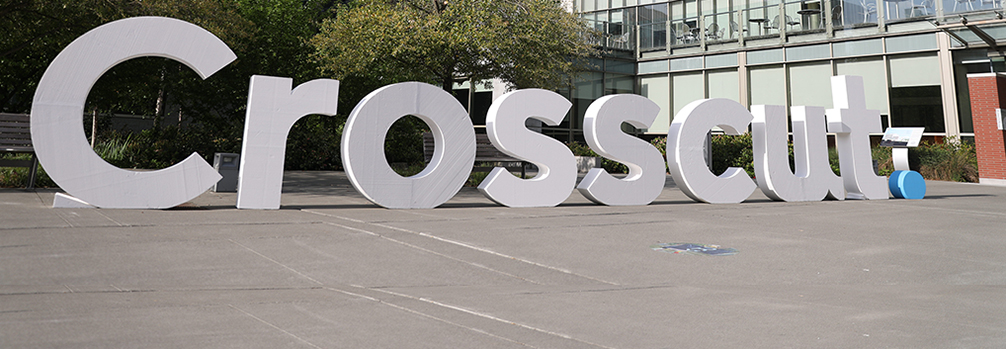
Crosscut.com, now 13 years old and comfortably nestled in the bosom of KCTS-TV, this week got an affectionate tribute from Knute Berger, the editorial mainstay columnist for the online site. It stirred memories of the early days when I and others cooked up the idea for what has turned out to be an important force in Seattle journalism.
The germ of an idea for Crosscut came from my longtime friend, Tom Alberg, the civic-minded leader of Madrona Venture Group, a prominent venture capital firm. Tom perceived the market opportunity for an online-only news site, thinking that costs could be contained by avoiding print and advertisers would flow to this new, targeted medium. A group of us, including Alberg, started brainstorming at weekly sessions in 2006. I was passing the baton at Town Hall Seattle to Wier Harman and so ready for a new adventure.
Crosscut.com launched in temporary offices at Madrona Venture Group. It was a commercial venture, though far from being anything that would draw venture capital. Among the early conceptualizers were Eileen Quigley (with whom I worked on an earlier quarterly, The New Pacific), Eric Magnuson (on technology), Barry Mitzman (a former colleague at Seattle Weekly), our first Editor, Chuck Taylor (from the Seattle Times and Seattle Weekly), and our first business manager, Yazmin Mehdi (who had helped the Town Hall board to find its new, stellar executive director). We soon set up our tiny shop in the 1411 Fourth Avenue Building, a hive of worthy enterprises long ago owned by that media muse, Dorothy Bullitt.
There were a few other models to guide us. One was Minnpost, which had been started by a former publisher of the Minneapolis Star Tribune (no less). Another was the immensely successful Texas Tribune, in Austin, which grew to be a politics-only, event-rich powerhouse in Texas and an inspiration to many later sites. They both had the good sense to be nonprofits, attractive to foundations. Crosscut’s hope for an advertising-supported model soon ran up against the realization that online ads were mostly drawn to big national numbers or Google. After 18 months, Crosscut decided to switch to nonprofit status, where it remains.
That wasn’t an easy switch. It took months to get IRS approval for nonprofit status, and then a long wait until the first key grant, from the Gates Foundation, came through and saved the sinking ship. To keep it alive, we cut (never-princely) freelance pay in half and I became an unpaid sole editor for a year. Mike Crystal, who had been the top business manager at Seattle Weekly, agreed to keep the business side going for that wilderness year.
Somehow we survived and then the Gates money came in ($200,000 per year for three years), thanks to Bill Senior’s interest in journalism. The resilient Crosscut rebounded, hired Mark Matassa (formerly with The Seattle Times) as editor, moved to a rundown building in Belltown (soon sold and replaced by a condo), and then to the Globe Building in Pioneer Square. Next step: to replace myself as publisher, and we signed up Greg Shaw from the Gates Foundation and Microsoft. Among the editors who arrived were Michele Matassa Flores (now executive editor at Seattle Times), Joe Copeland (from the P-I), and Berit Anderson (now of Scout Holdings).
Crosscut never paid its writers very well, but there were lots of good writers around. They liked the freedom, the companionship, and the well-informed audience of Crosscut. We had regular writers’ meetings (in Ancient Grounds Café at first) that were (I thought) quite scintillating. (Much the same spirit now pertains here at Post Alley, if I may say so!) Our two mainstays were Knute Berger, our star columnist and cheerleader, and business manager Marilyn Hoe (my former colleague from Town Hall), who knew and loved all the writers and was loved in return.
It was great fun. But we were also doomed — too small, undercapitalized, too narrow a readership. Rescue came when Greg Shaw got to know Rob Dunlop, CEO of KCTS, who had been brought in from KOMO-TV to shake up the slumbering public television station. Guided by a potent board, Dunlop was intent on acquiring other properties and diversifying the station and bringing back its hibernating news coverage. He proposed acquiring Crosscut, and Crosscut’s board president Brad Bagshaw managed to get reluctant folks at Crosscut and on the KCTS board to give the idea a try.
Suddenly Crosscut had a real newsroom staff, fine offices, fine benefits, fine marketing, and fine connections to donors. Dunlop was true to his word to keep Crosscut independent and well funded. And KCTS got itself back into the news business, in part by importing Crosscut stories to some short video segments.
In all, a pretty happy ending. The Crosscut staff is quite young and good — it being a buyers’ market for journalist talent. One complaint: Seattle media, including Crosscut, now have a sameness of approach (“follow the victim,” it’s been said). The synergy with KCTS is a bit strained and slow to develop, since PBS viewers are old and Crosscut is edited young. (Very well edited, I think.) I hope Crosscut’s teenage years don’t match in turbulence the economic uncertainties of post-COVID media.
The path was about as bumpy as Seattle streets these days. So I marvel at the outcome. Crosscut has grown into what I had once fondly imagined and never was able to achieve: Seattle’s second daily.
Discover more from Post Alley
Subscribe to get the latest posts sent to your email.

Nice piece, David, and good memories. Thanks for pioneering this and so many other things. And thanks to Brad Bagshaw for ferrying the enterprise across the River Jordan.
This is wonderful; thanks! I have loved Crosscut from the very beginning and it’s even better now.